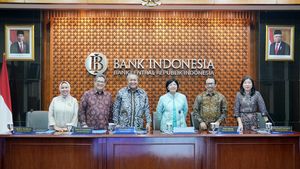BOGOR - The government has officially postponed the implementation of mandatory halal certification for micro, small and medium enterprises (MSMEs) until 2026.
Related to this, the Expert Staff for Inter-Institutional Relations of the Ministry of Cooperatives, SMEs Riza Damanik, said that his party would immediately coordinate with the local government (Pemda) to validate data on MSME actors who needed halal certification.
"We also strengthen socialization and literacy better. So, later we hope that in 2026 there will be no more issues related to halal certification," Riza said at the 2024 Journalists Orientation in Bogor, West Java, Thursday, May 16.
Riza emphasized that this delay is a breath of fresh air for MSME actors. This is because the halal certification policy, which originally took effect in October, was admitted by him to have reaped the polemic.
He considered that currently the important thing for the government was to encourage the productivity of MSMEs. In addition, there is a provision of massive assistance and socialization related to the policy.
SEE ALSO:
"We are monitoring to ensure that this can be realized. So, MSME players can be easier, faster, more aggressive to be involved in this initiative to register (halal certification)," he said.
The postponement of halal certification until 2026 was decided through a limited meeting (ratas) at the Presidential Palace, Jakarta, on Wednesday, May 15, 2024.
It is known that based on regulations, the obligation for halal certification will take effect from October 17, 2024, with a halal certification target of 10 million MSME actors.
However, the achievement of halal certification has only reached 4.42 million to date. This is still far from the expected target.
The English, Chinese, Japanese, Arabic, and French versions are automatically generated by the AI. So there may still be inaccuracies in translating, please always see Indonesian as our main language. (system supported by DigitalSiber.id)















